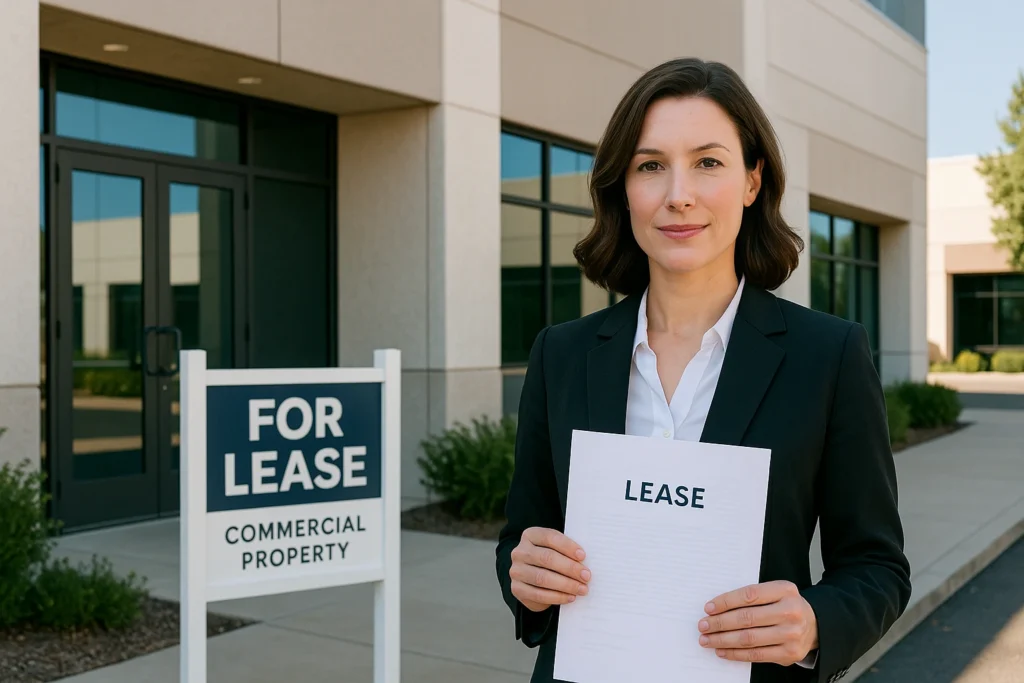Commercial leases in California follow different rules than residential ones. Business tenants often face stricter terms. Landlords have fewer legal duties.
Many renters do not know this until they face a dispute. Commercial property law in California leans heavily on contracts. The lease agreement shapes most of the rights and rules.
This guide explains how these leases work. It helps business owners understand their rights and risks. It also shows what to check before signing a deal.
Commercial leases can be long and full of legal terms. Small mistakes often lead to big problems. Clear planning prevents trouble later.
Every clause in the lease matters. Some allow sudden rent hikes. Others shift repair costs to the tenant. A small store may end up fixing a roof or paying large taxes.
Tenants must read every word. Do not rely on promises made outside the lease. Courts only enforce what is written.
Basics of a Commercial Lease
A commercial lease lets a tenant use a space to run a business. It covers offices, shops, warehouses, or restaurants.
The lease should name the tenant, list the rent, and describe the use. It should also state the lease length and rules about ending the lease.
In California, these leases rely on contract law. The state does not provide many protections. If the lease says the tenant pays for all repairs, then that is the rule.
Courts assume both sides understand the risks. They rarely offer help to those who fail to read the lease.
Most commercial leases include payment rules, default clauses, and limits on how the space may be used. These details matter more than people think.
A lease that allows a clothing store may not allow a café. Breaking this rule can lead to eviction.
Lease types vary. A gross lease means the landlord pays for taxes, repairs, and insurance. A net lease makes the tenant pay those costs.
A triple net lease puts nearly all duties on the tenant. Know the type before signing anything.
How It Differs from Residential Leasing
Business leases carry fewer protections than home rentals. Landlords do not have to keep the space livable.
They only do what the lease says. If the HVAC breaks and the lease is silent, the tenant might pay for the fix.
Tenants also lack eviction rights. A home renter often gets time to fix issues. A business tenant may receive a 3-day notice and then face court. These cases move fast. There is little time to argue or correct errors.
Security deposits follow a different rule. In residential leases, deposits are capped. Commercial leases have no cap.
A landlord may ask for six months of rent. That is legal unless the lease says otherwise.
Flexibility makes commercial leases complex. Landlords and tenants can set nearly any rule. One lease may ask for monthly rent and tax payments.
Another may demand sales reports or limit hours of operation. Nothing is standard. Each deal stands alone.
What Rights Do Commercial Tenants Have?
Business tenants have fewer rights than renters. Still, some basic rights apply. One is the right to use the space as agreed. If the lease says a bakery can operate, the landlord tenant cannot block that use.
Another is the right to quiet use. Landlords must not interfere without cause. Locking the tenant out without notice breaks this rule. So does turning off power or water. Tenants should always document these actions.
Tenants can ask for a renewal right. If included, this allows them to stay longer. Without this clause, the landlord may refuse to renew. Many leases end with no duty to extend.
Duties come with these rights. Tenants must pay on time, avoid damage, and follow lease terms. Some leases make the tenant clean, fix plumbing, or manage trash. All these tasks should be in writing.
Landlord Responsibilities in Business Leases
Commercial landlords must follow the lease. If the lease says the landlord repairs the roof, then that duty exists. If not, the tenant may bear the cost. Duties vary by agreement.
The landlord must also deliver the space on time. If the lease begins June 1 and the space is not ready, that causes harm. Tenants may ask for rent credit or delay start dates. These terms should be clear.
Landlords cannot disturb business use. Entering without notice or shutting off water can breach the lease. Tenants should keep records. A landlord’s mistake may give the tenant a legal claim.
Some landlords agree to upgrades or added services. These must appear in the lease. Verbal deals do not count. Always get every promise in writing.
Terms in Leases That Matter Most
Leases often use legal terms that confuse tenants. Learn what they mean. CAM stands for Common Area Maintenance. It means shared costs like cleaning, parking, or snow removal. Tenants often pay a share based on their space.
Base rent is the fixed amount each month. Some leases add a percentage rent based on sales. This is common in malls or markets. The lease should show when this applies.
Escalation clauses raise the rent yearly. They use inflation, fixed increases, or other tools. Look for these terms before signing. They change the long-term cost.
Default clauses list what happens if the tenant breaks the lease. They often add fees, penalties, or eviction rules. These rules matter in every dispute.
Security Deposits and Upfront Charges
California does not limit business deposits. A landlord can demand large sums. These cover damage or unpaid rent. Tenants must budget for this.
Ask what the deposit covers. The lease should list reasons for holding part of it. Landlords often deduct cleaning or repair costs. Take photos at move-in. Keep a record of all issues.
Some leases require advance rent. This covers future months. It is not a deposit. The lease should explain how this money is used. If silent, disputes may follow.
Ask for clear refund terms. A good lease tells when the deposit comes back and what counts as damage. Avoid vague terms.
Eviction Process in California Business Leases
Eviction rules favor landlords. If rent is late, the landlord gives a 3-day notice to pay or leave. If the tenant does not act, the case moves to court.
The landlord files a case called an unlawful detainer. The tenant has five days to answer. If not, the landlord wins by default. If answered, the court sets a hearing fast.
If the court sides with the landlord, the sheriff posts a notice. This gives five days to move. After that, the sheriff can remove the tenant. Courts act fast in these matters.
Some leases limit the tenant’s legal tools. Waivers may block delays or defenses. Read these terms before signing. Tenants often lose these cases because of lease terms.
What If You Need to Leave Early?
Ending a lease early can be costly. Most leases do not allow this without cause. If a tenant leaves, the landlord may sue for the balance.
Some leases offer early exit clauses. These require notice and payment. Others allow subleasing. This means finding another business to take over. Both options depend on the lease.
Talk to the landlord before leaving. Some accept a lump sum. Others may reduce the amount if a new tenant moves in. Get the deal in writing.
Always keep records. Note dates, payments, and promises. This can protect you in court.
Tips to Stay Safe Before Signing
Check the space before signing. Look for damage, safety risks, or needed repairs. Ask who pays for what. Walk through with the landlord. Take photos.
Check zoning. Make sure your business is allowed. Cities have rules. Selling food in a space zoned for retail may cause fines.
Talk to other tenants in the building. Ask about rent hikes or past disputes. Their answers give insight.
Use a lawyer. A commercial lease attorney finds risks and rewrites terms. This cost saves money later.
Ask for changes. Add caps to costs. Limit rent hikes. Ask for more notice before changes. The lease should protect both sides.
Bottom Lines
Commercial leasing in California gives landlords and tenants the power to set their own rules. The lease controls most parts of the deal.
Tenants cannot depend on the law to fix problems. They must protect their business through good contracts.
This guide shows how the system works. Read every lease. Understand each duty. Ask questions before signing. Smart planning helps avoid costly mistakes.
Speak with a lawyer if you have doubts. Each lease is different. What protects one tenant may harm another. Use the law to build a strong base for your business.
Clear terms and strong records lead to better outcomes. That is the path to safety in commercial leasing.
Related Post: Lawyer Specializing in Landlord Tenant Law: Lease, Repairs, and Evictions
Disclaimer: This guide shares general legal information. It does not give legal advice. Talk to a licensed attorney for help with your lease or case.



